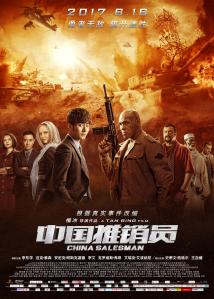Just a few weeks before Wu Jing’s Wolf Warrior II became the highest-grossing film to date in China (and the 6th highest-grossing worldwide in 2017, beating the likes of Guardians of the Galaxy Vol.2 and Wonder Woman), one film was already waving the Chinese flag in a war-torn African country, but had to settle for 191st in China’s yearly box office ranking: Tan Bing’s China Salesman. Two telecom companies, DH and MTM, are involved in a bidding war to become the main mobile network provider of an African country. But when a civil war erupts, with insurgents led by mercenary Kabbah (Mike Tyson), who is in cahoots with MTM, it’s left to Yan Jian (Ethan Li), DH’s I.T. engineer and salesman, to help the president secure a line of communication throughout the country to fight off the insurrection and restore peace. Also, alcohol is prohibited in the country, but tough-as-nails bar owner Lauder (Steven Seagal) doesn’t care.
Beyond patriotism and a war-torn African setting, China Salesman also shares with Wolf Warrior II its racial paradigm: noble Chinese, naive Africans, evil white people. But where Wu Jing’s mega-success made its more unsavory elements go down smooth thanks to a simple but effective plot and an abundance of over-the-top action sequences, Tan Bing’s film is a disaster on all fronts. The pathetically inane plot uses nebulous telecommunication stakes and muddled business palaver as its prime movers, while making feeble attempts at poignancy with perfunctory subplots involving the excision of little African girls and the plight of expropriated tribes.
The resulting cocktail is both foul and risible, the latter never more than when the various cast members deliver impassioned yet unintelligible tirades with the staggered diction and garbled consonants of people who are repeating a sentence they don’t comprehend and are about to forget. Ethan Li is a solid actor in his native Mandarin, but hilariously bad when wrestling with English, while French baddie Clovis Fouin and disposable female supporting parts Janike Askevold (from Norway) and Ai Li (Chinese) don’t fare any better. More fluent is Eriq Ebouaney as a sheikh, a very rare trace of professionalism in this wasteland of a film.
Action scenes are puny, staged with no sense of geography or pacing, and drenched in a deadeningly solemn tone, with a literal flag-waving sequence that makes the one in Wu Jing’s film look dangerously subversive. But beyond is faux-noble intentions (epitomized by a thudding title card at the end that yearns for “equality in mobile telecom”, I kid you not), the film’s marketing expectedly put much emphasis on the fight between Mike Tyson and Steven Seagal: the former, playing what the writers must have thought would be a heart-breakingly contrasted villain (he does bad things, but that’s because of colonialism!), seems to never have decided whether he should focus on attenuating his lisp or attempting a sort of vague “African tribe” accent.
Tyson, when well-employed and not given too much dialogue, can have a rather charismatic presence onscreen; here, he simply embarrasses himself, though to see him shed tears (are they real, or did an assistant gently drop them on his weathered cheeks in between takes?) is a novel sight. Sensei Seagal is often seen riding a motorbike (but not really: it’s obviously his face crudely pasted behind the helmet visor of some much fitter stuntman), and has the same loosely-defined supporting character as in much of his post-2010 output: some ambiguous tough guy with a past, who occasionally pops in to help the hero or deliver laconic wisdom. Though to see him grope his young assistant in the film is a sorry sight, in light of recent real life allegations made against the actor.
But back to the big Tyson-Seagal fight. Or rather, the short and poorly-edited Tyson-Seagal fight. Apparently, the two of them only agreed to film the fight if it were to be a draw. But not only were they probably never on set both at the same time (as not a single shot features both their faces clearly), wily director Tan Bing went ahead and used Seagal’s stunt double to make the outcome of the fight a clear win for Tyson. And so after Seagal tries to force Tyson to drink his employee’s piss, the two of them flail around at their respective stunt doubles for two minutes, after which we’re treated to the unique sight of Seagal (well, his double), getting his ass soundly kicked. Later in the film, the rotund sensei pops up again looking all high and mighty and oily, as if nothing had happened. And indeed, pretending this film never happened might be better for everyone involved.
Long Story Short: An amateurish disaster. 1/2*


